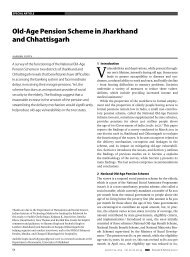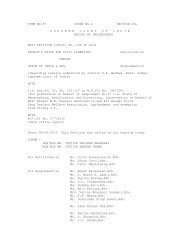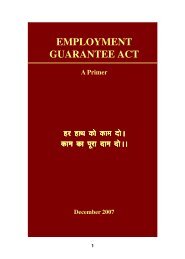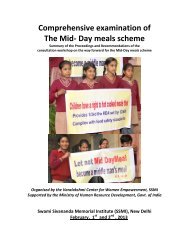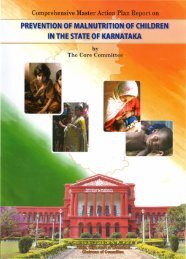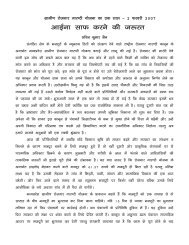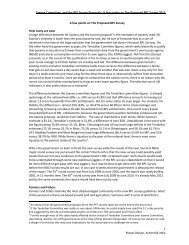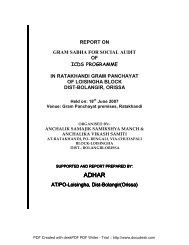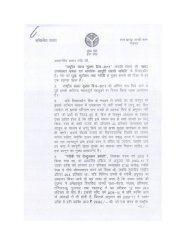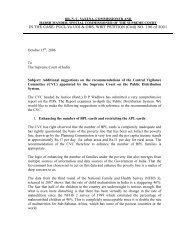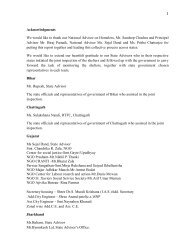<strong>NREGA</strong>: OPPORTUNITIES AND CHALLENGESnexus of local government officials <strong>and</strong> contractors is also a major reason for giving priority to roadconstruction <strong>and</strong> building works. It is just a convenient coincidence that it sometimes helps people getmore wages.Lakhroopi Pahariya, a l<strong>and</strong>less resident of Jenagadiya village in Pakur district of Jharkh<strong>and</strong>, was hopefulthat <strong>NREGA</strong> would be able to mitigate the acute water scarcity in his village by building pokhars (traditionalwater harvesting structures). However, the village Gram Sabha recommended road construction — there isa perception that digging pokhars would fetch about 40 per cent less money than the stipulated daily wageof Rs 76.68. The story repeats itself in several villages across Pakur, one of the poorest in the country. Thedistrict follows the piece rate method of payment for wages; this gives rise to the apprehension thatvillagers engaged in digging work will not be paid complete wages.Debate on wages continuesto haunt effectiveimplementation of <strong>NREGA</strong>.A labour in Rajasthan had todig 61 cubic feet to earn aminimum wage of Rs 73compared to a labourer inAndhra Pradesh who hadto dig only 44 cubic feetto earn a minimum wageTake the case of Sakhi Soren, 46, a daily wage worker of Surma village ofPakur. He worked on the digging of a pond for 13 days, <strong>and</strong> is yet to receivehis full wages of Rs 76.68 per day. As per the minimum wage, Soren shouldhave received Rs 996.84; instead, he got only Rs 750. Soren says that hewas told that the payment was done according to the amount of earth hedug, which was less than the stipulated 100 cubic feet (cu ft) per day. Goingby the wage calculation, he would have got the basic minimum wageconstructing a road as road construction has a different wage rate based onper day wage payment without any conditionalities of task rate.It is no wonder that in Pakur, of the total works, road construction workshave been completed the fastest – 40 per cent of all connectivity workshave been completed, while only 26 per cent of the water conservationworks are complete.In Dungarpur district of Rajasthan, much-celebrated for near perfectimplementation of <strong>NREGA</strong>, not a single case of full wage payment has comeof Rs 80to light. The highest wage received per day is around Rs 65 vis-à-vis theminimum state wage of Rs 73 15 . Clearly, there is a mismatch between theamount of work to be completed in order to earn a day’s wage <strong>and</strong> themeasurement of that work. The junior engineer in charge of Valota village inDungarpur, Ganesh Lal Raut, defends low wage payment by saying that the work completed in a day doesnot match the expected volume of the work to be done. District collector Neeraj K Pawan’s explanationabout low wage payment is also quite interesting. “<strong>NREGA</strong> guarantees employment <strong>and</strong> not wages. Thewages are low as people do not complete the stipulated amount of work for a day,” says Pawan.According to a senior official with the rural development department of Andhra Pradesh, a labourer inRajasthan has to dig 61 cu feet to earn a minimum wage of Rs 73, compared to a labourer in AndhraPradesh who digs only 44 cubic feet to earn a minimum wage of Rs 80. The New Delhi based Church’sAuxiliary for Social Action (CASA), in a study conducted in 113 districts across 14 states, says that worksare assigned at the group level, measurements are also done at the group level, but payments of wagesare made at individual levels. The report also hints that this makes certain works more lucrative thanothers (see Table: Variations in wage payment).An archaic formulaAt the core of the problem is the task rate wage payment. Under this system, a worker gets paid based on atask completed, or the st<strong>and</strong>ard scheduled rate in government parlance. The government fixes a certainamount of works to be completed every day for the labourer to get the basic minimum wage. This means alabour will be paid the minimum daily wage only if he or she has completed the stipulated amount of work.Over the years, the st<strong>and</strong>ard schedule of rates (SSR) for wage payment has evolved around contractors <strong>and</strong>machines but the <strong>NREGA</strong> doesn’t allow the use of contractors <strong>and</strong> machines. The <strong>NREGA</strong> offers employmentto persons capable of undertaking hard manual labour often in difficult field conditions with wages based onthis system.32
<strong>NREGA</strong>: OPPORTUNITIES AND CHALLENGESWhile the system of task rate wage payment ispermitted by the Act as well as the guidelines, thereare two important riders to it that have to be kept inmind while fixing norms. The first is that the wagespaid should not be less than the minimum wagesprevalent in the state. And the second, under nocircumstances should the wage rate under the taskrate system lead to workers getting less than the dailywage rate for workers working seven hours a day.The Union ministry of rural development hassuggested that states should carry out time-<strong>and</strong>motionstudies <strong>and</strong> compute ‘realistic’ rates. Onlythree states – Andhra Pradesh, Gujarat <strong>and</strong> TamilNadu — have done it. Karnataka has adopted thetime-<strong>and</strong>-motion study conducted by AndhraPradesh.The Hyderabad-based Centre for EnvironmentConcerns (CEC) has conducted time-motion-<strong>and</strong>workstudies using average workers in varying fieldconditions <strong>and</strong> a combination of sexes <strong>and</strong> agegroups; the studies, done in Medak district ofAndhra Pradesh across 15 works (includingTable: Variations in wage paymentStates Stipulated daily Average <strong>NREGA</strong>minimum wage wage actually paidAndhra Pradesh Rs 80 Rs 80Chhattisgarh Rs 67 Rs 62.63Jharkh<strong>and</strong> Rs 76.68 Rs 68Karnataka Rs 74 Rs 68Madhya Pradesh Rs 61.37 Rs 50Orissa Rs 70 Rs 65Rajasthan Rs 73 Rs 65Tamil Nadu Rs 80 Rs 80Uttar Pradesh Rs 100 Rs 60West Bengal Rs 68 Rs 68Source: Union ministry of rural development, field visit informationprovided by <strong>NREGA</strong> workers <strong>and</strong> officials.desiltation, jungle clearance, watering of plants, <strong>and</strong> spreading silt on fields), led to major changes in thescheduled st<strong>and</strong>ard rate of wages (see Table: Time-<strong>and</strong>-motion studies – Medak). The studies found thatthe labourers had to work three times more under the st<strong>and</strong>ard schedule rate to get the basic minimumwage. “The study helped to recognise the tasks done by women, who constitute the bulk of the <strong>NREGA</strong>workforce, to get wage entitlement, as earlier their work was invisible as outturn measurements werebased on the tasks done by men,” says K S Gopal, director, CEC. Based on the work, time <strong>and</strong> motionstudies, the Andhra Pradesh government issued orders in April 2007, modifying the wages earned byworkers under various works taken up under <strong>NREGA</strong>.For rationalising productivity st<strong>and</strong>ards <strong>and</strong> to fix wages for rural people employed under <strong>NREGA</strong>, theGujarat government has now brought out a single schedule of rates for rural areas. The rates were arrivedat following a time-<strong>and</strong>-motion study done by the Ahmedabad-based Centre for Environmental <strong>and</strong> PlanningTechnology (CEPT), which estimated the normal productivity of unskilled adults in various activities so thatthey could earn minimum wages as indicated under <strong>NREGA</strong>.The CEPT’s findings reveal that rural unskilled labour productivity is about 30-40 per cent of the newscheduled rate for rural areas. For example, the rates for excavation in ‘soft rock’ (with a depth of 4.5 to6 meter) as per the rates of the irrigation department, was Rs 68 per cubic meter. For decades, wages inGujarat had been decided based on wage rates of various departments, depending on the nature of thework, which created confusion. However, the CEPT recommended a rate of Rs 317.32 per cubic meter. Thestate government has now adopted a single rate based on the CEPT recommendations for efficientdisbursal of wages.33



